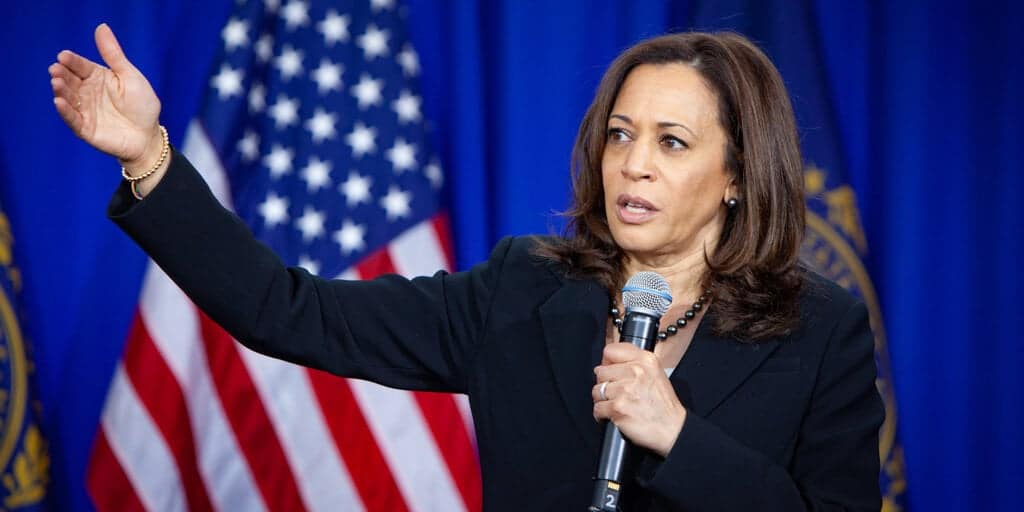Kamala Harris Criticism of Crypto Regulation Plans – But Optimism, Too
3 months ago Benito Santiago
Seeking to boost support among black male voters, Democratic presidential candidate Kamala Harris' campaign released a promotional agenda this week that promised cryptocurrency regulation to protect black men who invest in digital assets.
It was the most concrete statement to date from the current vice president, whose truncated campaign has received less attention than her Republican rival, former President Donald Trump, since taking over from Joe Biden in July.
The Harris campaign's move this week has drawn mixed reactions. While some crypto investors and industry members praised Harris' sharp language on crypto regulation, others criticized the frame as specifically targeting black men.
“It was long overdue; Dr. Ali Emdad, director of the Center for Blockchain and Financial Technology Research at Morgan State University, was waiting for an announcement of support from Kamala Harris to the crypto community and investors.
“Research shows that more than a quarter of black Americans own crypto, compared to 15% of whites, who are more accepting,” Dr. Emdad continued. — but regardless, the announcement had to be made.
Regulatory transparency can help foster innovation and help black communities take the lead in emerging technologies, Dr. Emdad said—though community leaders need to be actively involved in policy development to ensure the policy meets their unique needs.
He added: “Some will be skeptical because of the historical insecurity of the financial system, while others will welcome this as a step towards broader economic empowerment.” “It's like any big idea — there will be skeptics, open support and calls for deeper action.”
But not everyone believes him. Some members of the crypto industry saw the timing of Harris's announcement as purely politically motivated, especially as the initial buzz around her campaign died down early on Election Day.
An ABC/Ipsos poll of likely voters on Wednesday gave him a 51% chance of winning, compared to Trump at 48% – lower than before. Meanwhile, crypto bettors on Polymarket currently give the former Trump a 60% chance of victory compared to Harris at around 40%.
“I trusted her two years ago, not in an election year,” NFTCLT co-founder and chief marketing officer Tony Bravado told Decrypt.
“When I hear phrases like ‘supporting black men,' it sounds patronizing,” he continued.
Bravado and partner Shana Douglas travel around the country performing at schools and universities, including the historically black colleges Morgan State University (MSU) and the University of Southern California (USC). Their event aims to educate black Americans about blockchain, crypto and other technologies.
Look man, I've been in crypto for a long time now, there's no way I can be banned from using these apps because of the color of my skin, these are globally distributed unauthorized systems that anyone can access. …
— Ansem 🐂🀄️ (@blknoiz06) October 15, 2024
Bravado and other critics derided Harris's crypto statement as pessimistic and pessimistic, and also expressed concern that the exclusion of black men would place an unnecessary burden on a group struggling to access financial and financial opportunities.
“We don't get enough support as it is, and now we feel more pressure,” he said. “There are so many young people, women and other ethnic minorities who are trying to leave but are not mentioned.
Douglas, the founder of the NFTCLT, expressed concern that Harris' language could exacerbate disparities in the black community, particularly between men and women.
“It reinforces the gender divide that is often used politically in America to undermine the strength of the black community,” Douglas said. I think this rhetoric only reinforces the divide between black men and women, preventing us from coming together to act in a meaningful way – that's what this space is for.
Bravado and Douglas agree that a regulatory framework marked by clear and neutral labeling would be more helpful and effective than identifying a particular group in the political agenda.
“I'm not sure traditional lobbying is going to help with this because most of what's happening is coming from the big crypto companies,” Douglas said. “I don't think the small crypto people and business owners are going to get that support from the federal government if they want to be successful in this space.”
After releasing his agenda, the Harris campaign made it clear that all programs and initiatives in the Black Men's Agenda—including fully forgiven loans for entrepreneurs, and nationwide decriminalization of recreational marijuana—were intended to benefit all Americans and were not limited. By race.
Is Kamala going down in the polls and doubling down on the crypto/weed support of Dick Cheney and black men? It's like a parody of how DC Dems see voters.
— Li Fang (@lhfang) October 15, 2024
“This special focus recognizes the unique challenges and opportunities black men face in the digital economy and builds on her broader commitment to economic justice, ensuring that no one is left behind,” author and Penn State Dickinson Professor of Law, Tonya Evans, said in a statement. “While the focus on black men may seem targeted, it is part of a broader agenda that seeks to uplift all marginalized communities.”
Evans disagrees with the idea that the Harris campaign is pandering to black male voters, but instead believes it is based on genuine efforts to engage, listen and respond to the needs of diverse voters.
“Her approach demonstrates a commitment to earning the trust and support of each group while addressing their unique economic realities and opportunities in the Web3 economy,” she said. “In addition, her broad policies support all Americans while ensuring that the most vulnerable and underrepresented communities directly benefit from her initiatives.”
Harris's opponent, Trump, has made several comments to the crypto faithful since announcing his re-election bid, including an appearance at the 2024 Bitcoin Conference and the launch of several NFT drops. Recently, Trump launched a DeFi project called World Freedom Finance.
“Trump initiatives like World Liberty Financial raise concerns about central control and bias, but Harris wants to establish fairer regulations that protect small investors and empower communities,” Evans said.
Trump repeatedly said that a bankruptcy in November would be bad for crypto and developers in the industry. Investors in the value of bitcoin and other assets seem to agree, following closely his moves in the election, which some analysts have called a “Trump trade.”
“If we don't win the election, there will be people who were under investigation and are now free as birds” and people who have not seen in the crypto world. Hell – because if they win, it starts the day after the election.
While Trump has been more open about his plans around crypto, Evans is adamant that Harris' approach is the overall right path for the industry's future.
“Unlike Trump's recent pivot to crypto, which some see as an attempt to court voters without addressing systemic issues, Harris covered digital assets in her opportunity economy platform,” Evans said. “Her policies aim to create an inclusive environment where new technologies like blockchain benefit the wider population rather than the few.”
Edited by Andrew Hayward.
Daily Debrief Newspaper
Start every day with top news stories, plus original features, podcasts, videos and more.












